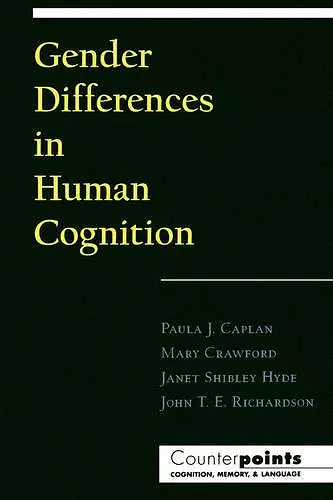Gender Differences in Human Cognition
Mary Crawford editor Paula J Caplan editor John T E Richardson editor Janet ShibleyJS Hyde editor
Format:Paperback
Publisher:Oxford University Press Inc
Published:6th Nov '97
Currently unavailable, and unfortunately no date known when it will be back

This volume in the "Counterpoints Series" summarizes and addresses the validity of research into gender differences. It also questions the ideology behind this research, and its consequences. The work is intended for researchers and students in the field of cognitive psychology and women's studies, and psychologists interested in gender issues.
"This evaluation of current research in gender studies as they relate to cognition should be of particular interest to psychologists, educators, and policy-makers."--Shirley R. Rausher, Readings "Within the first pages, the authors focus their scholarly energies on verbal, spatial, and mathematical abilities because, we are told, researchers typically have searched for individual differences within such test domains. All four authors provide highly readable 30-page chapters, each taking a variation on the same perspective, i.e., that whatever cognitive differences you thought had been demonstrated between males and females should not be considered biological . . . This reviewer found the book's contents highly stimulating and informative, providing both valid and pseudoarguments to reject the very existence of sex differences in verbal, spatial, mathematical, and scientific abilities. . . . future researchers ignore the message of this text at their peril."--Journal of the International Neuropsychological Society "Results of some research suggest that gender differences have been growing smaller over recent decades. Here, five contributions discuss whether women and men differ in terms of their intellectual abilities; and, if there are differences, what are the origins--biology, childhood influences, cultural stereotypes? If there are no differences, why do people continue to assert that differences do exist? The essays discuss relevant research using the techniques of meta-analysis, pitfalls in the conception and execution of research on the topic, and the negative consequences of a focus on differences."--Reference & Research Book News "This evaluation of current research in gender studies as they relate to cognition should be of particular interest to psychologists, educators, and policy-makers."--Shirley R. Rausher, Readings "Within the first pages, the authors focus their scholarly energies on verbal, spatial, and mathematical abilities because, we are told, researchers typically have searched for individual differences within such test domains. All four authors provide highly readable 30-page chapters, each taking a variation on the same perspective, i.e., that whatever cognitive differences you thought had been demonstrated between males and females should not be considered biological . . . This reviewer found the book's contents highly stimulating and informative, providing both valid and pseudoarguments to reject the very existence of sex differences in verbal, spatial, mathematical, and scientific abilities. . . . future researchers ignore the message of this text at their peril."--Journal of the International Neuropsychological Society "Results of some research suggest that gender differences have been growing smaller over recent decades. Here, five contributions discuss whether women and men differ in terms of their intellectual abilities; and, if there are differences, what are the origins--biology, childhood influences, cultural stereotypes? If there are no differences, why do people continue to assert that differences do exist? The essays discuss relevant research using the techniques of meta-analysis, pitfalls in the conception and execution of research on the topic, and the negative consequences of a focus on differences."--Reference & Research Book News
ISBN: 9780195112917
Dimensions: 156mm x 234mm x 15mm
Weight: 308g
192 pages